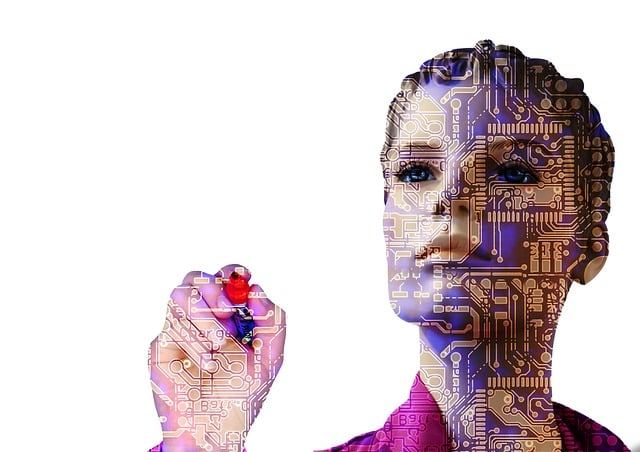Artificial Intelligence and Business Today
Artificial Intelligence (AI) is transforming how businesses operate today, from automating repetitive tasks to using data science, providing real-time insights for decision-making. AI can help organizations improve efficiency and productivity while reducing costs. The technology enables companies to quickly analyze vast amounts of data, identify patterns and trends humans may miss, and provide recommendations for optimizing business processes.
AI Lets You Focus on the Customer
One of the most significant advantages of using AI in business is its ability to improve customer experience through personalized communication and tailored product recommendations. For instance, chatbots powered by natural language processing (NLP) can interact with customers on a website or social media platform 24/7, answering their queries promptly and accurately.
AI Can Run Scenarios and Predict Your Audience’s Next Move
Moreover, AI-powered predictive analytics tools enable businesses to forecast demand more effectively and optimize inventory levels accordingly. This technology helps companies avoid stockouts while minimizing overstocking expenses.
Using Artificial Intelligence Can Give Your Business a Competitive Edge
Artificial Intelligence has become an essential tool for modern businesses looking to stay competitive in a constantly evolving marketplace. By leveraging this advanced technology across various departments such as marketing, sales, supply chain management, and more, organizations can unlock new opportunities for growth while improving overall efficiency and customer satisfaction.
How Are Businesses Using AI to Help Them Grow and Thrive?
Artificial Intelligence (AI) has become an essential tool for businesses looking to grow and thrive in today’s digital age. AI technology is used by companies of all sizes across various industries, including healthcare, finance, retail, and manufacturing.
- Sales and Marketing: By leveraging these machine learning models and algorithms, companies can analyze customer data to identify patterns and predict buying behaviors. This enables them to effectively target their advertising efforts and generate higher conversion rates.
- Supply Chain Management: With the help of predictive analytics tools powered by AI, companies can track inventory levels more accurately and optimize their logistics processes. This results in reduced costs, improved efficiency, and faster delivery times.
- Customer Service: Chatbots powered by natural language processing (NLP) algorithms can provide customers with instant support 24/7 without the need for human intervention. This not only improves customer satisfaction but also helps reduce operational costs.
- Business Operations: AI is also being used to streamline business operations such as legacy systems such as accounting, invoicing, and scheduling appointments automatically to improve efficiency while reducing errors caused by manual inputting of information.
- Human Resources: AI is being utilized within human resources where it is increasing efficiency through reducing costs, seen through automated chatbots, and completing redundant tasks, which creates extra time for employees to complete their own and new tasks.
- Training & Educating Employees: AI doesn’t only improve employee efficiency. It also enhances their knowledge and skills through customized, instant answers to their queries and through real-life scenarios that act as valuable practice for employees.
The utilization of Artificial Intelligence shouldn’t be seen as a threat to business leaders but rather as an opportunity for businesses that want to stay ahead in this ever-evolving technological landscape. Using the data, an AI can gather can give your business insight that other companies may miss.
How Can AI Be Used for Sales and Marketing?
Artificial Intelligence is changing the game in sales and marketing. With ai and machine learning and its ability to analyze big data well, AI helps businesses identify patterns and trends that can help their sales teams generate more leads. AI’s predictive analytics tools provide valuable insights into customer behavior, allowing companies to create personalized marketing campaigns that target specific audiences.
Chatbots
Business chatbots are also becoming increasingly popular in the field of digital marketing. Chatbots are programmed with natural language processing capabilities that enable them to converse with customers on social media platforms or websites. This makes it easier for customers to get answers to their questions quickly and efficiently without having to wait for a human representative.
Score Leads
Another way AI is being used in sales and marketing is through lead-scoring technology. Lead scoring uses machine learning algorithms to analyze data from different sources, such as website visits, email open rates, social media engagement rates, and more data, helping businesses understand which leads are most likely to convert into paying customers.
User Behavior Analysis
AI-powered recommendation engines offer personalized product recommendations based on user behavior analysis. These engines leverage past purchase history and other forms of customer behavioral data combined with deep learning techniques like neural networks or decision tree modeling, providing even better results than traditional recommendation systems based solely on item popularity or ratings.
How Can AI Be Used for Supply Chain Management?
Artificial Intelligence (AI) can be a game-changer in supply chain management. With the help of AI, businesses can streamline their processes and improve efficiency levels in various ways.
Predictive Analysis
One way AI is used in supply chain management is through predictive analytics. By analyzing data from past orders and deliveries, AI algorithms can predict future demand more accurately. This helps businesses optimize inventory levels, reduce stockouts, and prevent overstocking.
Optimizing Logistics
Another area where AI can help is logistics optimization. Real-time tracking data analysis of shipments enables companies to automatically reroute packages around traffic or weather disruptions. This not only ensures timely delivery but also reduces transportation costs.
Customer Service Bots
AI-powered chatbots are another tool businesses have increasingly used to enhance customer service support for their supply chain operations. Chatbots provide instant responses to commonly asked questions about shipping status, estimated delivery times, or even product details – improving overall customer satisfaction while reducing response time for human representatives.
Help Your Business Run Better with AI for Business
Incorporating AI into the supply chain process has numerous benefits, including better decision-making abilities based on advanced analytical capabilities and the ability to respond instantly to constantly changing circumstances with minimal human intervention required, thus increasing productivity levels within organizations that incorporate it into their daily workflow routines.
How Can AI Be Used for Customer Service and Improved Customer Experience?
Artificial intelligence is transforming the customer service industry by providing personalized experiences to customers. AI algorithms help businesses understand customers’ needs and preferences and understand customer requests, leading to better decision-making processes.
Humanistic Chatbots
One of the ways that AI is helping improve customer experience is through chatbots. Chatbots are computer programs that mimic human conversations, allowing them to answer customer queries without involving a human agent. This saves time and provides 24/7 support, making customers feel valued and attended to.
Predicting Customer Behavior Patterns
Another use case of AI in customer service is predictive analytics; it helps businesses forecast future trends based on historical data, enabling them to make informed decisions about product development or marketing strategies. By analyzing past behavior patterns of customers, companies can anticipate their needs and respond proactively.
Answering Questions Based on Context
Natural Language Processing (NLP) also allows machines to understand human language in its context and provide relevant responses accordingly. With NLP-powered systems, businesses can analyze feedback from social media platforms or emails quickly and accurately while identifying key sentiments behind those messages.
Emotional Reaction Tracking
Moreover, facial recognition technology combined with sentiment analysis can help track how customers react emotionally during an interaction with a business representative or when using a product/service provided by the company. Thus allowing organizations to tailor their offerings more effectively according to individual behaviors. However, businesses should be aware of facial recognition technology and its legal restrictions.
How Can AI Be Used to Boost Business Operations?
AI technology is rapidly transforming the way businesses operate. By automating many of the routine tasks that employees perform, AI frees up valuable time and resources that can be used to focus on more critical business operations. One way in which businesses are utilizing AI for their operations is by using robotic process automation and implementing chatbots.
Support Chatbots with Natural Language Processing (NLP)
Chatbots are computer programs designed to simulate conversations over messaging apps or websites with human users. They can handle customer inquiries, provide technical support, and even assist with sales transactions. Chatbots use natural language processing (NLP) algorithms to understand customer queries and provide relevant responses in real-time.
Predictive Maintenance
Another application of AI within business operations is predictive maintenance. Predictive maintenance uses machine and deep learning models and algorithms to analyze data from sensors attached to machines and detect patterns that indicate when a machine may need maintenance before it breaks down completely.
Collect and Analyze Data
In addition to process automation, AI-powered data analytics and tools can help businesses gain insights into vast, massive amounts of data quickly and accurately. These tools automate the process of data collection, analysis, and reporting so that decision-makers can access actionable insights faster than ever before.
Increasing Business Efficiency
Incorporating AI into business operations has proven effective in increasing efficiency while reducing costs associated with labor-intensive processes such as manual data entry or routine tasks like addressing customer requests and responding to customer inquiries. As this technology continues to evolve at an unprecedented rate, we should expect further advancements in its capabilities for business operations management in the future.
How Can AI Be Used for Human Resources?
AI technology is not only changing the way businesses operate but also how they manage their human resources. Using AI for HR functions has allowed many companies to streamline their business functions and processes, increase productivity, reduce costs, and improve employee satisfaction. One of the most significant advantages of using AI in HR is its ability to automate routine tasks, freeing up valuable time for employees and managers.
Recruiting Chatbots
Companies increasingly use AI-powered chatbots to handle recruitment tasks such as screening resumes and scheduling candidate interviews. This technology can help speed up the hiring process while ensuring that all applicants receive a timely response regardless of whether or not they meet the qualifications.
Productivity and Performance Analysis
Performance management is another area where AI can be incredibly beneficial, allowing companies to automatically analyze data on employee productivity and performance metrics. This information provides insights into which employees may need additional training or support, helping managers make more informed decisions about promotions or disciplinary actions.
Predict Future Workforce Needs
Many organizations use predictive analytics software powered by machine learning algorithms to anticipate future workforce needs based on the existing trends and patterns in hiring practices. This approach helps businesses proactively plan for changes in staffing requirements rather than reacting after shortages occur.
Employee Insight
In addition, AI-powered tools can provide personalized insight into each employee’s specific needs and any skills gaps they may have. By analyzing an individual’s performance records across various job-related competencies over time, these systems identify areas where further development could benefit them professionally.
Improve Employee Efficiency and Productivity
The use of AI technologies within Human Resources offers many benefits that help optimize various aspects of a business’s workforce management processes while improving efficiency and productivity throughout an organization. The more insight businesses have about current and future employees, the more those same businesses can work to retain their employees instead of having to pay to get new ones.
How Can AI Be Used for Employee Training and Education?
Employee training and education is an essential aspect of every organization, as it helps employees to improve their skills and enhance productivity. With the help of AI, employee training and education can be taken to the next level.
Training Employees in Their Best Learning Styles
AI-powered learning systems are capable of providing personalized content that caters to each employee’s unique skill set, pace, style, and preferences. Employees can learn at their convenience without any disruption in their work schedules.
Answer Questions Instantly
Furthermore, organizations can use AI-based chatbots to respond instantly to common questions about training materials or certifications. This improves the effectiveness of employee training programs while reducing the workload on HR teams.
Practice with Realistic Scenarios
In addition, using AI-based simulations for job roles enables employees to practice real-life scenarios in a safe environment without risking any damage or loss caused by human error. This technology allows employees to develop new skills and gain valuable experience through virtual hands-on training.
Upskill Employees
Incorporating AI into employee training and education programs has immense benefits for organizations looking to upskill their workforce effectively while promoting a culture of continuous learning and development amongst their employees. This can also help retain more employees, as continued education is an excellent reason for many employees to stay with a company long-term.
Start Improving Your Business Processes with Artificial Intelligence & Machine Learning Today
Artificial intelligence has become essential for businesses seeking to improve their operations and gain a competitive edge. From sales and marketing to supply chain management, customer service, HR, and employee training, AI offers numerous business benefits that companies can leverage to grow and thrive.
However, while AI presents many business opportunities today, business leaders must note that implementing this technology requires careful planning and execution. Companies must first identify the areas where they could benefit most from AI before investing in expensive technologies or hiring data scientists.
By understanding how AI can help them achieve their business goals and taking proactive measures to integrate these emerging technologies and solutions into their existing workflows effectively, organizations worldwide will undoubtedly see significant improvements in efficiency, productivity, and customer satisfaction levels, ultimately leading to the growth of any business.



















